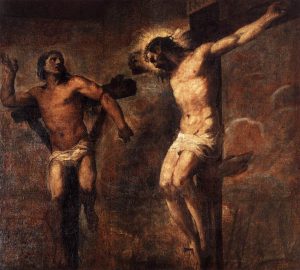1 Thessalonians 5:1-11
This text is used for the Lectionary Year A on November 26, 2017.
 Three specific sermons themes arise out of this text. First, there is a humbling challenge to earthly governments that needs to be proclaimed in the U.S. today. Second, there is a metaphor of a thief in the night representing the Parousia that is an apt reminder of what is coming next. Third, Paul does not leave theological concepts in the abstract giving multiple applications for the church today to prepare for the coming of the Kingdom of God.
Three specific sermons themes arise out of this text. First, there is a humbling challenge to earthly governments that needs to be proclaimed in the U.S. today. Second, there is a metaphor of a thief in the night representing the Parousia that is an apt reminder of what is coming next. Third, Paul does not leave theological concepts in the abstract giving multiple applications for the church today to prepare for the coming of the Kingdom of God.
In the ancient world, Pax Romana was the common theme. The government established and maintained peace in this world. It was a wonderful time of prosperity for many in the region. Similarly, in the last 250 years, the U.S. has worked to establish a Pax Americana. We like the Romans would tout our stability as “peace and safety” (v. 3). There is great room here for the preacher to talk about all the wonderful things the Romans did for society and all the things the U.S. has contributed. From there it may be worth asking the question how much peace and prosperity we can expect on this earth. What is the greatest hope for society on this side of eternity?
From there the preacher should move into the Gospel. It would be good to look at passages like Psalm 20:7 that acknowledge that so many in this world put all their trust in chariots and horses, or put all their trust in human government when even the greatest governments fail us. There is room to examine how people routinely fail you in all areas of life, but our God will never fail you. You could share how even good friends fail you, or how well-intentioned parents fail you, and lead up to human institutions failing you. Verse 3 is a reminder that all human governments fail, the Roman government did not last and neither will the United States of America. There will be a day when our country no longer dominates the world, and as that day approaches where will we put our faith? All of this points us to the work of Jesus Christ on the cross. God knows humanity failed and continues to fail, but has provided a solution that will redeem us from the failed peace and security of human might.

 “You brood of vipers!”
“You brood of vipers!” Each year after Thanksgiving, my family and I start our preparations for the season of Christmas. We have our “traditions” if you will. Naturally we start with the tree, which is decorated with a menagerie of ornaments collected over the last 30 years: the felt Snoopy I made in kindergarten, the ornament we bought at Disney World in 2002, paper chains made by our kids several years ago, and ornaments with baby photos of each child from their most cherub-like years.
Each year after Thanksgiving, my family and I start our preparations for the season of Christmas. We have our “traditions” if you will. Naturally we start with the tree, which is decorated with a menagerie of ornaments collected over the last 30 years: the felt Snoopy I made in kindergarten, the ornament we bought at Disney World in 2002, paper chains made by our kids several years ago, and ornaments with baby photos of each child from their most cherub-like years.